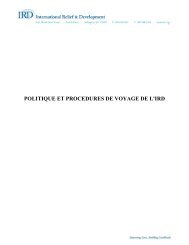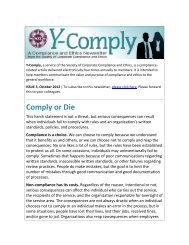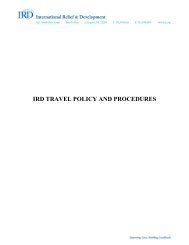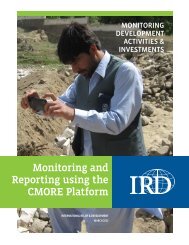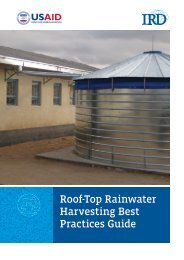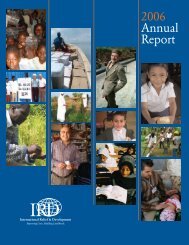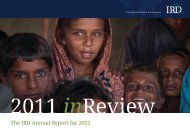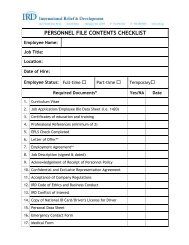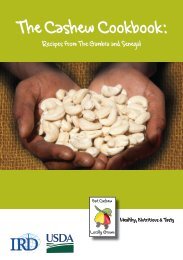Empowering citizens Engaging governments Rebuilding communities
Empowering citizens Engaging governments Rebuilding communities
Empowering citizens Engaging governments Rebuilding communities
Create successful ePaper yourself
Turn your PDF publications into a flip-book with our unique Google optimized e-Paper software.
“<br />
Many colleagues have told me<br />
that Awni gave IRD a lot of credibility<br />
in that region of the world”<br />
—Dr. Arthur B. Keys<br />
1<br />
Box 2<br />
Awni Quandour: IRD’s original elder statesman (continued)<br />
Building community trust<br />
At the time, aside from foreign military, they were the only non-Iraqis around. Quandour’s experience and familiarity<br />
with the country, however, proved crucial in getting ICAP and IRD’s regional operations established quickly. “Dr. Keys<br />
said that he wanted to go to the poor areas of Baghdad first, before the others,” Quandour said. “I told him that all<br />
the areas were poor.”<br />
Quandour and Keys knocked on doors and talked to the residents, and they learned that in some areas people were<br />
sleeping on their rooftops because their houses were flooded with sewage. With trash and debris everywhere, and<br />
with sewage backed up as high as a foot or more on some roads, “we determined that just cleaning the streets<br />
would be our first project, after listening to people talk about how they were living.”<br />
In the matter of a few weeks, Quandour and ICAP’s chief of party, Terry Leary, hired their staff, created a training<br />
plan, began street-cleaning and trash-removal operations, and started organizing ICAP’s first community action<br />
group. “People were desperate and wanted some type of sign that life would improve,” Quandour said. “We gave<br />
them hope.”<br />
Quandour’s first position with IRD was as ICAP’s community outreach director. Before long, he became the program’s<br />
deputy chief of party before assuming the chief of party role. He hired and trained IRD’s initial Iraqi staff,<br />
many of whom still work with IRD almost a decade later. He played a critical role in adapting the ICAP model on a<br />
wider scale-up when IRD began implementing CSP in 2006.<br />
In Afghanistan, Iraq, Jordan, Pakistan, and other locations, Quandour helped hone IRD’s project work in unstable<br />
environments, and many current staff credit him with being the founding father of IRD’s community development and<br />
stabilization programs.<br />
“Many colleagues have told me that Awni gave IRD a lot of credibility in that region of the world,” Keys said. “His<br />
relationships with local <strong>communities</strong> were invaluable to making the Iraq programs work. Local staff looked up to<br />
Awni as an elder statesman. He was ready to go back to Iraq, saying that when he regained his strength, he would<br />
return to that country.”<br />
While Quandour never had the opportunity to return to Iraq, his legacy and his work live on through the organizational<br />
strategy he helped craft and through his own personal ties—his daughter Zain and his niece Farah both work on IRD<br />
projects in Jordan.<br />
(box 2). According to Quandour, as the community<br />
groups flourished, tension developed between IRD<br />
and local political leaders, some of whom accused<br />
Quandour of “causing problems” and subsequently<br />
used their power to delay the approval of projects.<br />
“There was some rivalry between the council<br />
members and the community action groups,” he said,<br />
“because the CAGs suddenly had the ability to create<br />
projects that weren’t part of the council’s administrative<br />
structure.”<br />
12


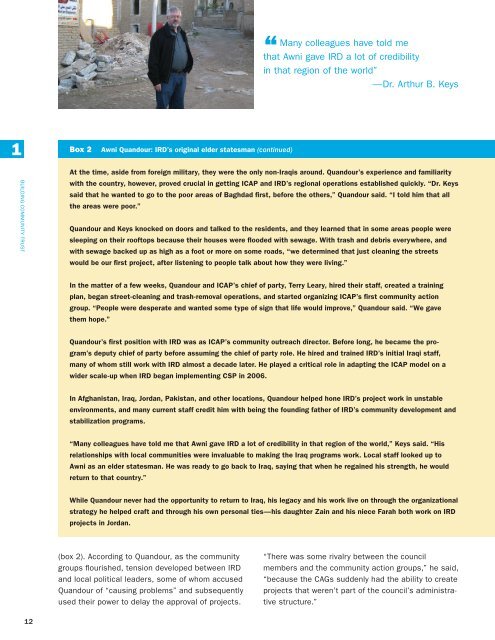
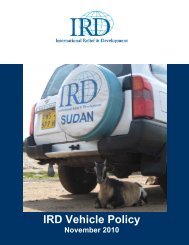
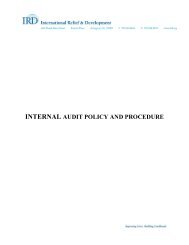
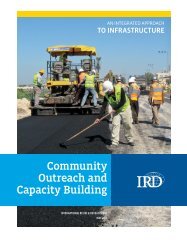
![Guide bonne pratique production d'oignon qualité_VF_4_2411012[1]](https://img.yumpu.com/23506639/1/184x260/guide-bonne-pratique-production-doignon-qualitac-vf-4-24110121.jpg?quality=85)
